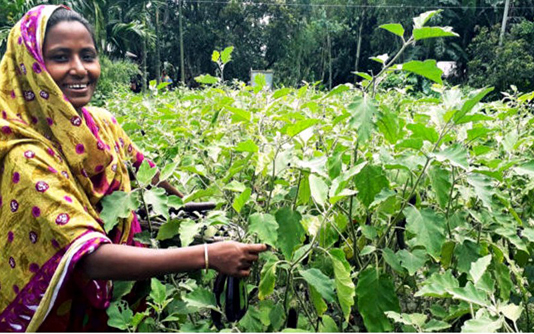RANGPUR, Feb 14, 2021 (BSS) – Pesticide-free vegetables’ farming
adopting eco-friendly agricultural technologies without pesticides is
expanding in char areas bringing fortune to many char people in Rangpur
agriculture region.
Officials of the Department of Agricultural Extension (DAE) said
vegetables and spicy crops like sweet pumpkin, brinjal, balsam, basil,
carrot, radish, spinach, squash, onion, garlic, gourd, green chili and tomato
are mostly being cultivated on char lands.
Being inspired by the DAE, hundreds of landless, small and marginal
farmers living in char and riverside villages have brought vast tracts of
char lands under vegetables’ farming in all five districts of the region this
season.
The vegetables are being cultivated adopting eco-friendly agriculture
technologies and intercropping methods using organic fertilisers and
agronomic management to produce more nutritious vegetables.
Deputy Director of the DAE for Rangpur Agriculturalist Dr. Md. Sarwarul
Haque said farmers are cultivating pesticide-free vegetables using composts
and organic pesticides without using chemical pesticides on char lands like
in some areas of mainland.
“Popularisation of ecological agriculture like cultivation of pesticide-
free vegetables on char areas with application of biofertilisers and composts
can reduce negative impacts of conventional agriculture on public health,
environment and ecology,” he added.
Kawnia Upazila Agriculture Officer in Rangpur Agriculturist Md. Saiful
Alam said Bangladesh is a riverine country where many people are living in
char areas and erosion, floods, droughts and adverse situations have become
their companions.
Considering these aspects, the DAE is providing training, inputs and
counseling to char people on farming pesticide-free vegetables adopting eco-
friendly technologies on char areas during the last 12 years.
“Being inspired, char people are expanding cultivation of pesticide-free
vegetables to enhance production of poison-free vegetables in riverine char
areas,” Alam added.
In Kawnia upazila alone, people have brought 130 hectares of char lands
and dried-up riverbeds under farming of pesticide-free vegetables to enhance
production of poison-free vegetables on the Teesta riverbed this season.
Sub-assistant Agriculture Officer Emdadul Haque of Balapara union in
Kawnia upazila said farmers are cultivating chemical pesticide-free
vegetables on char lands adopting latest technologies.
Talking to BSS, housewife Bijlee Begum of village Char Pran Nath in
Kawnia upazila said she has changed fortune through farming pesticide-free
brinjal adopting eco-friendly technologies on char lands.
Being inspired by the DAE, Bijlee with her husband Manjurul had started
cultivating brinjal on 20 decimals of char lands on the erosion-prone Teesta
riverbed three years ago.
“I applied vermin composts and used sex pheromone traps while farming
brinjal adopting eco-friendly technologies without using chemical fertilisers
or pesticides. I am getting excellent yield and lucrative profits now like in
the previous years,” Bijlee said.
Farmers Belal Hossain and Dulal Mian of Char Harin Sharma village in
Tepamadhupur union of Kawnia upazila said they are harvesting pesticide-free
vegetables to reap excellent profits following lucrative prices.
Farmer Ful Mian of char Madaripara village in Haripur union of
Sundarganj upazila in Gaibandha said he has cultivated brinjal on two bighas
of char lands. He is earning well now by selling harvested brinjal at better
prices.
Farmers Monser Ali and Dhirendra Nath of Char Chawrabari village on the
Dharla riverbed in Phulbari upazila of Kurigram said they are reaping
excellent profits by selling their cultivated pesticide-free brinjal on one
bigha of land each this season.



